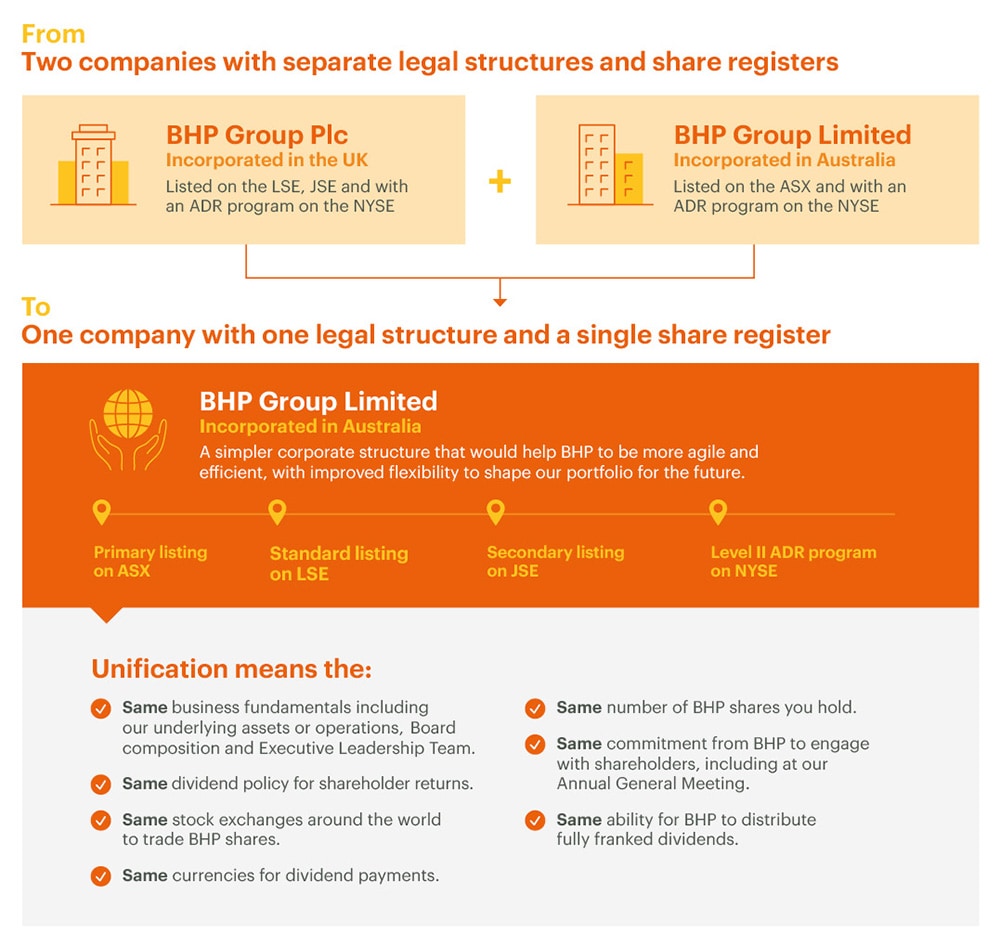Frequently asked questions
Please read our FAQs for general, shareholder and partner queries.
Unification will provide a simpler corporate structure that will make BHP simpler and more agile, with the strategic flexibility to shape our portfolio for the future.

BHP’s Board supports unification as being in the best interests of BHP shareholders. Watch this video from CEO Mike Henry to hear more on the rationale and benefits of a simpler corporate structure.
Now is an attractive time to unify BHP’s corporate structure as we continue to position our portfolio to grow value from commodities that will benefit from global trends such as decarbonisation and economic growth.
Just as we continually review and enhance our portfolio, we also regularly review our Dual Listed Company structure to ensure it is fit-for-purpose. The most recent review concluded now is the right time to unify our corporate structure.
A simpler corporate structure will make BHP simpler and more agile, with the strategic flexibility to shape our portfolio for the future. For example, unification would enable BHP to undertake certain transactions more simply and efficiently than it can under the Dual Listed Company structure. This includes the agreement to merge BHP’s Petroleum business with Woodside Petroleum. Future demergers and equity raising transactions would also be simpler to execute following unification.

Watch this short video to better understand BHP’s Dual Listed Company corporate structure today, and the long-term shareholder value a unified corporate structure can enable in the future.

Under a unified corporate structure, BHP Group Limited shares would be listed on the Australian, London and Johannesburg stock exchanges, with an American Depository Receipt (ADR) program on the New York Stock Exchange.
If you are a shareholder in BHP Group Limited, you will retain your existing shareholding in a unified BHP. Unification won’t change BHP’s ability to fully franked dividends.
If you are a shareholder in BHP Group Plc, you will have your shares exchanged for shares in the unified BHP Group Limited on a one-for-one basis.
Unification won’t change the things you rely on. BHP’s business including our Board, management and dividend policy will remain the same.
Shareholders will have the opportunity to vote on unification at shareholder meetings held on 20 January 2022 for BHP Group Limited in Melbourne and BHP Group Plc in London respectively.
A Shareholder Circular, a UK Prospectus and other shareholder documents are available here.
Unification is expected to complete by 31 January 2022 subject to approval by the shareholders of both BHP Group Limited and BHP Group Plc, receipt of remaining regulatory approvals and UK Court sanction of the scheme.

This short video explains the how the one-for-one share exchange works for Plc shareholders and what changes they can expect.

BHP is in great shape. We have a strategy to grow value from commodities that will benefit from global trends such as decarbonisation and population growth. Unification help us deliver that strategy.
Please read our FAQs for general, shareholder and partner queries.
BHP has announced a final Board decision to unify its corporate structure from two parent companies, with two share prices, into one under BHP Group Limited.
BHP currently operates under a Dual Listed Company structure with two parent companies each with separate primary stock exchange listings - BHP Group Limited on the Australian Securities Exchange (ASX) in Australia and BHP Group Plc on the London Stock Exchange (LSE) in the United Kingdom. The two groups operate as a unified economic entity with a common board and management, and shares in Limited and Plc carry equivalent voting and economic rights.
A unified BHP would have one share price globally and primary listing on the ASX, a standard listing on the LSE, a secondary listing on the Johannesburg Stock Exchange (JSE), and a Level II American Depository Receipt (ADR) program on the New York Stock Exchange (NYSE).
Unification will not change BHP’s fundamentals: it will not change BHP’s underlying assets or operations, Board composition, Executive Leadership Team, corporate presence or cash flow generation. Importantly, there will also be no change to BHP’s dividend policy, including its ability to pay franked dividends, as a result of unification.BHP is a global resources company, supplying geographically diverse customers with essential resources, supported by a presence across 90 locations worldwide. A unified corporate structure will not change this.
Unification provides a simpler corporate structure that will make BHP simpler and more agile, with the strategic flexibility to shape our portfolio for the future. We believe unification will help drive value and create new possibilities for BHP and our shareholders. It’s an important step that will set our company up better for the future.
Unification will result in BHP having a corporate structure that is easier for investors and other stakeholders to understand. We would move from two parent companies, with two share prices, into one under BHP Group Limited – our existing Australian parent company.
For example, we would have one Annual General Meeting, a single set of company laws and one primary tax residency.
A unified structure would also provide a simpler dividend funding arrangement for BHP without changing our dividend policy. BHP shareholders will continue to receive their dividends in the same currency as they do now.
BHP will have one share price globally and we will continue to have listings on the Australian, Johannesburg and London stock exchanges and its NYSE listed American Depository Receipt program.
BHP is strengthening our position to supply commodities to meet the world’s evolving needs for decarbonisation and population growth.
A unified corporate structure will help BHP to be more agile and efficient, with improved flexibility to shape our portfolio for the future.
For example, unification would enable BHP to undertake certain transactions more simply and efficiently than it can under the DLC structure. This includes, for example, the agreement to merge BHP’s Petroleum business with Woodside Petroleum which would be simpler to execute under a unified structure.
Future demergers and equity raising transactions would also be simpler to execute following unification.
Unification will not change BHP’s fundamentals: it will not change BHP’s underlying assets or operations, Board composition, Executive Leadership Team, corporate presence or cash flow generation.
Importantly, there will also be no change to BHP’s dividend policy, including its ability to pay franked dividends, as a result of unification.
The DLC structure was put in place at the time of the merger of BHP and Billiton in 2001.
At the time, the proportion of assets held under BHP Group Plc and BHP Group Limited were relatively aligned. With changes over recent years to the BHP portfolio, a significant reduction in the earnings contribution from the assets held under BHP Group Plc and a material reduction in the expected costs of unification, we believe that now is the right time to unify the corporate structure.
BHP has regularly reviewed our Dual Listed Company structure to ensure it is fit-for-purpose
The most recent review concluded now is the right time to unify our corporate structure – we believe that this is the best structure for BHP to provide the resources the world needs and create long-term shareholder value.
Now is an attractive time to unify BHP’s corporate structure as:
At shareholder meetings held on 20 January 2022, BHP received the required support of BHP Group Plc and BHP Group Limited shareholders for unification. As unification involves a UK scheme of arrangement, it will also require the UK Court’s sanction of the scheme at a hearing on 25 January 2022.
With all approvals to proceed, unification is expected to occur on 31 January 2022. Detailed timelines of final trading days of BHP Group Plc shares and the one-for-one share exchange for BHP Group Plc shareholders are available in the Shareholder Circular.
Yes. Shareholders will have access to an Independent Expert’s Report as part of the shareholder documents and will be able to review their conclusions.
BHP Group Limited currently has a primary listing on the Australian Stock Exchange which we would keep under a unified corporate structure.
If you are a BHP Group Limited shareholder, you will retain your shareholding and proportionate interest in the unified BHP. Unification won’t impact BHP’s ability to fully frank dividends.
BHP will retain a secondary listing on London Stock Exchange and its shares will still be traded in sterling.
BHP Group Plc shareholders will have their BHP Group Plc shares exchanged for BHP Group Limited shares on a one-for-one basis. Some smaller shareholders will also have the option to receive cash for their new BHP Group Limited shares as part of a Share Sale Facility. Further information will be available in the Shareholder Circular.
Shareholders will not pay any brokerage fees to receive their BHP Group Limited shares as part of unification.
UK and South African residency shareholders can continue to receive their dividends in pounds or rand respectively.
BHP has a secondary listing on the Johannesburg Stock Exchange (JSE) where BHP Group Plc shares can be traded. BHP proposes to maintain a secondary listing on the JSE, with BHP Group Limited shares being traded instead of BHP Group Plc shares.
To transition to one register, BHP Group Plc shareholders will have their shares exchanged for BHP Group Limited shares on a one-for-one basis. Some smaller shareholders will also have the option to receive cash for their new BHP Group Limited shares as part of a Share Sale Facility. Further information is available in the Shareholder Circular.
Shareholders will not pay any brokerage fees to receive their BHP Group Limited shares as part of unification.
BHP Group Plc and BHP Group Limited both each currently have an American Depository Receipt (ADR) program. ADR programs allow US investors to hold interests in non-US companies.
Under a unified structure, BHP would have one ADR program where interests in BHP Group Limited can be traded on the New York Stock Exchange. BHP Group Plc ADR holders will receive BHP Group Limited ADRs on a one-for-one basis.
The holdings of BHP Group Limited ADR holders will not change as a result of unification.
BHP does not speculate on our share price.
After unification there will be one share price globally (a BHP Group Limited share price) across the exchanges (adjusting for foreign exchange rates). Investors will be able to trade their BHP Group Limited shares on the Australian Securities Exchange, London Stock Exchange and Johannesburg Stock Exchange and their American Depository Receipts on the New York Stock Exchange.
Historically BHP Group Plc shares have traded at a lower price than BHP Group Limited shares. BHP Group Plc shareholders would receive shares in our Australian listed company, BHP Group Limited. BHP Group Limited will have its primary listing on the ASX. Shares of companies on the ASX have historically traded at a higher price-to-earnings ratio (price/earning multiple) compared with shares of companies on the LSE.
Unification will not change the factors used by the market to determine the BHP Group Limited share price – our Board, management team and strategy will not change.
Unification will not affect BHP’s ability to distribute fully franked dividends to shareholders.
All BHP Group Limited shareholders will receive franking credits with their dividends.
There may be taxation implications for certain shareholders that vary depending on your jurisdiction and personal circumstances. General information is provided in the Shareholder Circular. Shareholders are advised to seek their own specific taxation advice.
Please also see linked Form 8937 (Report of Organizational Actions Affecting Basis of Securities).
Pursuant to U.S. Internal Revenue Code section 6045B, Form 8937 (Report of Organizational Actions Affecting Basis of Securities) is required to be made available when an issuer of a specified security has taken organizational actions that affect the U.S. tax basis of those securities. The tax information contained herein is provided for informational purposes only and should not be construed as legal or tax advice.